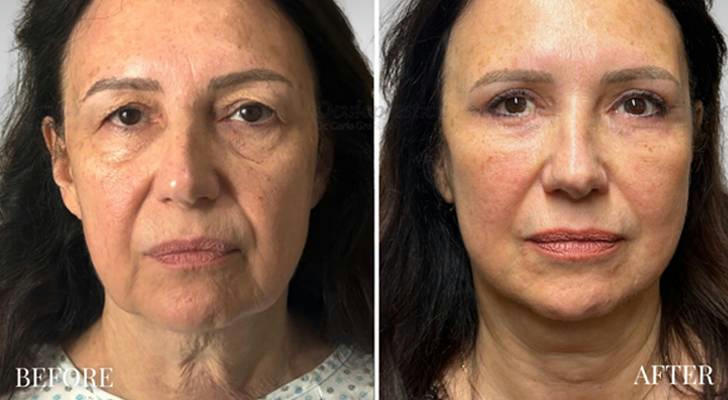Can't afford eyelid surgery? Find out how to qualify for NHS eyelid surgery!

Eyelid surgery, or blepharoplasty, is a procedure that removes excess skin, fat, or muscle from the eyelids to improve vision and comfort. While many consider it a cosmetic treatment, the UK’s National Health Service (NHS) provides this surgery only when medically necessary. If you're struggling with drooping eyelids that impair your vision or cause chronic discomfort, you may qualify for NHS-supported blepharoplasty.
This guide explores the eligibility criteria, application process, benefits of NHS vs. private surgery, and common myths to help you make an informed decision.
Eligibility Criteria for NHS-Funded Eyelid Surgery
The NHS does not fund blepharoplasty for cosmetic reasons. Instead, approval depends on medical necessity, with strict criteria:
1. Vision Impairment Due to Drooping Eyelids
If sagging eyelids (ptosis or dermatochalasis) obstruct your vision, you may qualify.
An ophthalmologist will perform a visual field test to confirm the obstruction.
Patients often report difficulty reading, driving, or seeing clearly.
2. Chronic Eye Irritation or Infections
Excess eyelid skin can cause dryness, redness, or recurrent infections.
If rubbing eyelids lead to corneal damage, surgery may be approved.
3. Severe Eye Strain & Headaches
- Heavy eyelids can force you to constantly lift your eyebrows, leading to muscle fatigue and headaches.
4. Functional Eyelid Disorders
Entropion (inward-turning eyelids) or ectropion (outward-turning eyelids) may qualify if they cause pain or corneal damage.
Blepharospasm (uncontrolled eyelid twitching) may also be eligible.
❌ Cosmetic concerns alone (e.g., wrinkles, under-eye bags) do not qualify.

NHS vs. Private Eyelid Surgery: Key Differences
| Factor | NHS Blepharoplasty | Private Blepharoplasty |
|---|---|---|
| Cost | Supported (if approved) | £2,000–£6,000+ |
| Eligibility | Strict medical need | Open to all (cosmetic included) |
| Waiting Time | Months to years | Weeks to a few months |
| Consultation | Brief, NHS protocol | Personalized, longer sessions |
| Surgeon Choice | Assigned by NHS | Choose your specialist |
| Follow-Up Care | Limited (NHS constraints) | Comprehensive aftercare |
Advantages of NHS Eyelid Surgery**
✅ Supported if approved.
✅ Performed by qualified NHS surgeons.
✅ Focuses on medical necessity, ensuring functional improvement.
Advantages of Private Eyelid Surgery**
✅ No waiting lists – faster treatment.
✅ Cosmetic enhancements are available (e.g., under-eye bag removal).
✅ More surgeon options and personalized care.
💡 If your case is borderline, consider a private consultation while waiting for NHS approval.
Common Myths About NHS Eyelid Surgery
❌ Myth 1: "NHS supports cosmetic eyelid surgery."
✅ Fact: NHS only supports blepharoplasty for medical reasons, not aesthetics.
❌ Myth 2: "Private surgery is always better."
✅ Fact: NHS surgeons are highly skilled—outcomes are similar, but waiting times differ.
❌ Myth 3: "If rejected once, you can’t reapply."
✅ Fact: You can appeal or reapply if your condition worsens.
❌ Myth 4: "Recovery takes months."
✅ Fact: Most patients resume normal activities in 2 weeks, though full healing takes longer.
How to Apply for NHS Eyelid Surgery: Step-by-Step
Step 1: Consult Your GP
Explain how your eyelids affect vision, comfort, or daily life.
Provide evidence (e.g., photos, symptom diary).
Request a visual field test if needed.
Step 2: Ophthalmologist Referral
If your GP agrees, they’ll refer you to an ophthalmologist.
The specialist will assess:
Degree of vision obstruction (via perimetry tests).
Severity of eyelid drooping.
Impact on eye health (e.g., corneal damage).
Step 3: NHS Approval or Rejection
If approved, you’ll be placed on a waiting list (can take months).
If rejected, you can:
Appeal with additional medical evidence.
Seek a second opinion.
Consider private surgery.
Step 4: Surgery & Recovery
The procedure takes 1–2 hours (usually under local anesthesia).
Recovery involves 1–2 weeks of swelling, with full results in 3–6 months.
Final Thoughts: Is NHS Eyelid Surgery Right for You?
If your eyelids impair vision or cause discomfort, NHS blepharoplasty could be life-changing. However, strict criteria mean not everyone qualifies.
If you’re unsure, consult your GP first—they’ll guide you on the best path. For those who don’t qualify for NHS treatment, private clinics offer flexible, cosmetic-friendly options.
- .: (Other contents)
